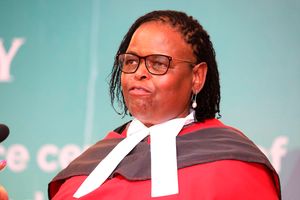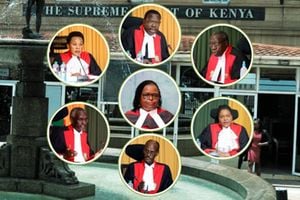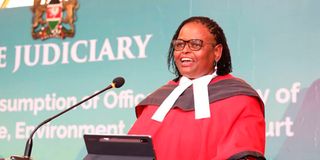
Chief Justice Martha Koome.
The Judicial Service Commission is set to reconvene on Tuesday with the proposed removal of the seven Supreme Court judges, including Chief Justice Martha Koome, top of the agenda.
The meeting will be chaired by the Commission's vice-chairperson Isaac Rutto and will be attended by nine members.
However, the CJ, who is the Commission's chairperson and Justice Mohammed Ibrahim -the representative of the Supreme judges at JSC -will not attend the Tuesday meeting since they are among the defendants in the ouster petitions.
Though Mr Rutto failed to immediately respond to phonecalls and text messages seeking details of the planned meeting, a highly placed source in the goings-on, disclosed that the commissioners will discuss their next move after the judges obtained orders stopping the JSC committee from continuing with the hearings of complaints filed against them.
CJ Koome last Friday led the judges in suing the JSC and rejecting the disciplinary proceedings pointing to a looming Constitutional crisis and power vacuum in the event the judges are suspended from office pending investigations.
She expressed fear that without a stop order from the court, the files at JSC were likely to be forwarded to President William Ruto with a recommendation for the constitution of a disciplinary tribunal to hear the complaints and effectively suspend the Supreme Court.
Pointing to a Constitutional crisis that may occur with the suspension of the Apex Court judges, CJ Koome said "it is the Supreme Court alone that has jurisdiction to determine the validity of a state of emergency, the validity of presidential elections, sit on appeals concerning the removal of judges from office and provide advisory opinions".
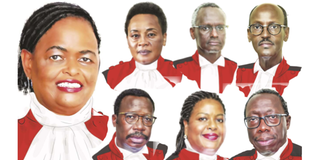
Chief Justice Martha Koome (left), Deputy Chief Justice Philomena Mwilu (top), Justices Isaac Lenaola and Ibrahim Mohamed. (Bottom row) Justices Smokin Wanjala, Njoki Ndung'u and William Ouko.
"No other person or authority is authorised to carry out the Constitutional functions which are specifically designated to the Supreme Court.
Consequently, the actions of JSC in proceeding with the processing of the petitions will result in a de facto suspension of these Constitutional imperatives and deprive the people of Kenya of their fundamental rights," she said in the court filings.
According to her, sweeping away the entire bench would be unconstitutional since the "Constitution does not anticipate a circumstance the Constitution can operate without the Supreme Court".
She believes that the petitions at JSC are intended to create a Constitutional vacuum and crisis in the country.
In addition, the CJ says the JSC does not have powers to oversight the Supreme Court.
The complaints were filed by former Cabinet Minister Raphael Tuju's Dari Limited and lawyers Nelson Havi and Christopher Rosana seeking the removal of the entire bench from office over claims of misconduct, misbehaviour and incompetence.
While Mr Tuju's complaint involves handling a commercial dispute pitting Dari Limited and East African Development Bank, lawyers Havi and Rosana complaints concern a unanimous decision of the judges to ban lawyer Ahmednassir Abdullahi over his social media posts regarding the court.
Mr Havi and Mr Rosana were angry that the ban was imposed through a letter and was extended to all lawyers working at Mr Abdullahi's law firm.
The conservatory orders obtained by CJ Koome together with Justice Njoki Ndung'u and a Kenyan identified as Mr Pariken Ole Esho from Narok came at a time the Commission was expecting responses from the judges before considering the same vis-a-vis the complaints.
The judges were on January 27, 2025, asked to respond to the complaints after a JSC Complaints Sub-committee chaired by Commissioner Omwanza Ombati found the issues raised by the petitioners had merit.
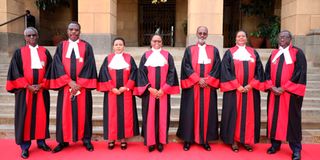
Supreme Court judges (from left) Isaac Lenaola, Dr Smokin Wanjala, Philomena Mwilu, Martha Koome, Mohamed Ibrahim, Njoki Ndung’u and William Ouko on January 20, 2022.
With both the complaints and the responses on the table, the full Commission would have decided whether to proceed to the plenary hearing stage, where the judges would have faced their accusers and the witnesses.
Read: Relief for CJ Koome, Supreme Court judges as High Court stops petitions to remove them from office
Later the Commission would have made a decision on whether to dismiss the petitions or forward them to the President with a recommendation for constitution of a tribunal.
The deadline for filing the responses was Monday, February 24, 2025.
Instead, the judges rushed to court for a conservatory order. Deputy Chief Justice Philomena Mwilu also filed a preliminary objection at the JSC contesting the commission’s powers to entertain the petitions.
She faulted the Commission for admitting the petition by lawyer Nelson Havi for listing all seven judges together as defendants instead of lodging the complaint against individual judges.
Interestingly, it may not escape observers that Mr Havi was her advocate five years ago in another dispute where the Directors of Public Prosecutions and Criminal Investigations together with three individuals were pushing for her removal from office on allegations of misconduct related to claims of improper dealings with a bank. She was later cleared by the court.
“The Commission lacks the requisite jurisdiction to hear and determine the Complaint as drawn and filed on account of the express provisions of Article 168 of the Constitution which specifically only mandates the Commission to initiate the removal of a judge from office on the basis of the grounds set out in Article 168 (1) of the Constitution on account of individual and personal culpability and not on the basis of collegial decisions of the Supreme Court,” said the Deputy Chief Justice in the objection.
The scheduled hearing spells a showdown between the seven judges and JSC.
The other Commissioners are Attorney-General Dorcas Oduor, Caroline Nzilani Ajuoga (public representative), Evalyne Olwande (Kenya Magistrates and Judges Association female representative) and Jacquilne Ingutiah (Law Society of Kenya female representative) and Charity Kisotu (public service commission representative).
Others are Justice Fatuma Sichale (Court of Appeal judges’ representative) Omwanza Ombati (LSK male representative) and Justice Anthony Mrima (Kenya Magistrates and Association male representative).
Unlike her predecessors, CJs David Maraga and Willy Mutunga who submitted themselves to the Commission for hearing of complaints lodged against them, CJ Koome is the first CJ to sue the Commission after being asked to submit her response to a complaint.
In her court papers, CJ Koome says the Commission does not have ultimate power over the Supreme Court.
Additionally, she says the Constitution says the power of JSC is on the removal of a 'judge' from office not 'judges'.
"JSC has no jurisdiction whatsoever to entertain any petition with regard to a court, whether disguised as a petition initiated against all the members constituting the said court individually or against the court itself. Indeed it is the Supreme Court which has ultimate authority over JSC on matters of removal of judges of superior courts," her lawyer George Oraro says in the court papers.
He adds, "Constitution does not conceive any circumstances under which the Supreme Court can be subordinated to the JSC".
The lawyer says removal of a judge from office is three steps, the first being for the JSC to consider the complaint and satisfy itself that the same discloses a reasonable ground for removal and send the petition to the President.
The second step is for the President to suspend the judge in question and form a disciplinary tribunal to inquire into the allegations made following which the tribunal makes appropriate inquiries and a binding recommendation to the President.
And the final step is the right of the judge to appeal to the Supreme Court if aggrieved by the decision of the disciplinary tribunal.
According to lawyer Oraro, by admitting the ouster petitions against the entire seven-judge bench JSC denied the individual judges right of appeal and clogged their right to a fair hearing and right to access to justice as well as equal protection and equal benefit of the law.
The court cases will be mentioned on March 5 and 12, 2025.

